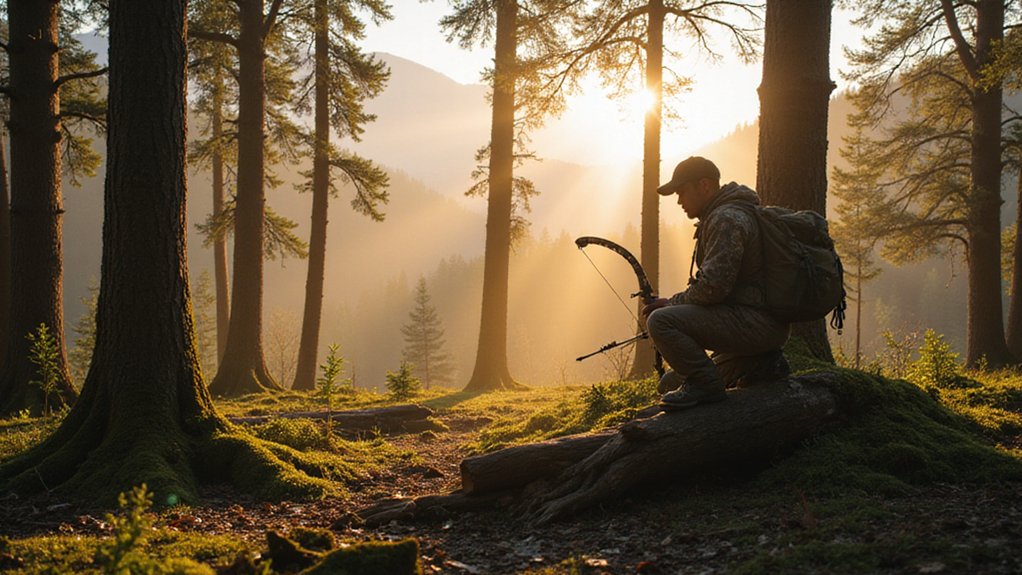When you decide to go solo hunting, preparation is key. You’ll need to understand your hunting area, gear up with the right equipment, and prioritize safety. It’s not just about the thrill of the chase; it’s about ensuring you’re ready for whatever comes your way. So, what should you consider before heading out on your own? Let’s explore the essential tips that can make your solo hunt both successful and enjoyable.
Solo hunting tips for beginners: What do you need to know?
If you’re new to solo hunting, it’s essential to prepare properly before heading out.
Start by researching your hunting area; know the terrain, weather, and wildlife. Familiarize yourself with local regulations to avoid any legal issues.
Practice your shooting skills to boost your confidence and accuracy. Always tell someone your plans, including where you’ll be and when you’ll return.
Pack essential supplies like food, water, first aid, and a map.
Finally, trust your instincts and stay aware of your surroundings. Solo hunting can be rewarding, but safety should always be your top priority.
Happy hunting!
How to choose the right gear for solo hunting
Choosing the right gear for solo hunting is essential, as it can greatly impact your experience and success in the field.
Start with a reliable firearm or bow that you’re comfortable using. Invest in quality clothing suited for weather conditions, ensuring it’s breathable and waterproof.
Don’t forget a sturdy backpack to carry your essentials, including food, water, and first-aid supplies. Opt for a lightweight tent or tarp for shelter, if necessary.
A portable GPS device or compass will help you navigate. Finally, consider a good pair of binoculars to spot game from a distance.
Gear up wisely for an enjoyable hunt!
What are the best strategies for staying safe while hunting alone?
When heading into the field alone, safety should be a top priority. Always let someone know your plan, including your location and expected return time.
Carry a fully charged cell phone and a portable charger for emergencies. Wear bright, visible clothing to avoid accidental shootings. Use a GPS or map to navigate and stay aware of your surroundings.
Bring a first-aid kit and know basic medical skills. Avoid risky terrains, and if you encounter wildlife, keep a safe distance.
Trust your instincts; if a situation feels off, don’t hesitate to leave. Staying prepared and vigilant can make all the difference.
How can you effectively track and scout for game when solo hunting?
While scouting for game on your own, understanding animal behavior and signs can greatly enhance your chances of success.
Start by looking for tracks, droppings, and feeding areas to gauge animal movement. Pay attention to the time of day; many animals are more active during dawn and dusk.
Use wind direction to your advantage, ensuring your scent doesn’t alert nearby animals. Set up trail cameras to gather intel on wildlife patterns without being present.
Finally, familiarize yourself with the terrain and identify potential spots for ambush or observation. Staying patient and observant will reward your solo hunting efforts.
Why is it important to have a solid plan before going solo hunting?
Having a solid plan before heading out on a solo hunt not only boosts your confidence but also greatly increases your chances of success. A well-thought-out strategy helps you navigate the wilderness safely and effectively.
Here are three key components of your plan:
- Location: Choose an area with known game activity and suitable terrain for your skills.
- Timing: Plan your hunt around peak activity times for the species you’re targeting.
- Communication: Inform someone of your plans and expected return time for safety.
With a solid plan, you’ll feel more prepared and focused on achieving your hunting goals.
What techniques can enhance your success during solo hunts?
To enhance your success during solo hunts, mastering a few key techniques can make all the difference.
Start by scouting your area thoroughly; knowing the terrain and animal patterns boosts your confidence. Use stealth to approach your target quietly, minimizing noise and movement.
Practice patience, as waiting can lead to better opportunities. Employ effective tracking methods to follow signs of wildlife.
Consider using calls or scents to attract game. Finally, verify your gear is lightweight and efficient; carrying only what you need helps you stay agile.
These techniques can greatly increase your chances of a successful solo hunt.
How to stay motivated and focused when hunting alone?
Staying motivated and focused during solo hunts can be challenging, especially when you’re out there alone for hours on end.
To keep your spirits high and your mind sharp, try these strategies:
- Set clear goals: Define what you want to achieve each outing, whether it’s spotting a specific animal or honing a particular skill.
- Stay engaged: Bring along a journal to record your experiences, or take photos to document your journey.
- Take breaks: Allow yourself short breaks to recharge, reflect, and enjoy your surroundings, helping you stay refreshed and ready to continue.
What are the key considerations for solo hunting in different environments?
When you venture into different environments for solo hunting, several key considerations can make or break your experience.
First, understand the terrain—whether it’s dense woods or open fields, each demands unique strategies.
Next, assess weather conditions; rain or wind can affect visibility and animal behavior.
Always prioritize safety by informing someone of your location and expected return time.
Equip yourself with appropriate gear, including navigation tools and first-aid kits.
Be mindful of local wildlife regulations and potential hazards.
Ultimately, stay adaptable; conditions can change, and your hunting methods may need to adjust accordingly for success.
